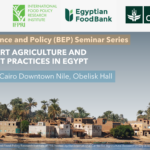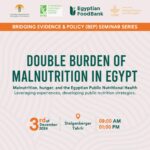Egypt stands at a critical juncture, facing significant environmental stresses exacerbated by climate change, despite being a relatively minor contributor[1] to global greenhouse gas emissions. The nation’s already hot and arid climate is experiencing increasing average temperatures, with projections indicating continued increases. Climate change significantly impacts Egypt’s agricultural sector[2], a vital contributor to the country’s GDP, foreign cash reserves, food security, and employment. Absent adaptation, rising temperatures, increased land salinity due to rising sea levels in the Nile Delta, limited surface water resources and rapid exploitation of groundwater resources will reduce agricultural productivity in the future.
BEP Seminar Series: Malnutrition, Hunger, and the Egyptian Public Nutritional Health
Egypt is among the countries confronting the simultaneous challenge of both undernutrition and overnutrition. Around 14% of the Egyptian population experience food insecurity, with the country ranking 57th out of 121 nations on the 2023 Global Hunger Index. This position indicates a moderate incidence of hunger. Moreover, approximately 40% of Egyptian adult population is obese, while around 18% of children under the age of 5 are obese and 22% are stunted (impaired growth, short for their age). This co-existence of multiple forms of malnutrition is known as the double burden of malnutrition, a compounding issue for Egyptian public health & safety.
روسيا تنهي مبادرة حبوب البحر الأسود: ماذا بعد لأوكرانيا والعالم؟
كان من المقرر تجديد الصفقة، التي تم وضعها قبل عام تقريبًا، للمرة الرابعة. في غضون ساعات من الإعلان، شنت روسيا هجومًا صاروخيًا على ميناء أوديسا. في اليوم التالي، أدت الهجمات الصاروخية الروسية على منشآت مناولة الحبوب الرئيسية في أوكرانيا إلى ارتفاع أسعار عقود القمح الآجلة إلى أكبر ارتفاع لها في يوم واحد منذ فبراير 2022. وبحسب ما ورد علقت شركة تأمين على الشحن تعمل بموجب الاتفاقية تغطيتها لشحنات الحبوب الأوكرانية في البحر الأسود.
The Russia-Ukraine Conflict and Global Food Security
When Russia invaded Ukraine in February 2022, sparking fears of a global food crisis, IFPRI responded rapidly to the need for information and policy advice to address the crisis. From the first moments of the conflict, a new IFPRI blog series provided critical information and insights into the impacts on food security, caused by rising food, fertilizer, and fuel prices and trade disruptions, for vulnerable countries and regions.




